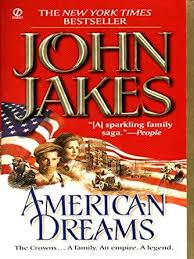
American Dreams is the sequel to Homeland, a novel in which John Jakes explores the immigrant experience in this country. In Homeland, young Paul Crown leaves Germany to seek a better life in America. He lives with his uncle, Joseph Crown, who immigrated years before and has become a very successful beer brewer.
I’d like to say that American Dreams picks up where Homeland leaves off. At the end of Homeland, Joseph Crown apparently saw the light in that his need to control his family was instead driving all of them away, and it seemed that he was changing his ways. Joseph accepted his daughter’s desire to explore the possibility of an acting career, as well as Paul’s rejection of a top-notch education (paid for by Joseph) to pursue working in moving pictures. Through many twists and turns, Paul ends up as a documentary filmmaker, filming many important events that are shown as short pieces in theaters.
However, in American Dreams, Jakes seems to forget all the change that came over Joseph Crown at the end of Homeland. Instead, he is once again estranged from almost his entire family. Daughter Fritzi is suffering through a lack of success in the theater. Her father’s initial support seems to have made a complete about-face and she struggles to make ends meet.
The younger son, Carl, discovers he is not college material, much to his father’s chagrin. Instead, he pursues working with Henry Ford test-driving vehicles, as well as racing them in his spare time. This evolves into a need for more daring over the course of the novel. When the opportunity presents itself, he learns to fly a plane.
Paul continues to make pictures. At the end of Homeland, he had been offered a job working out of London, which he rejected. Where American Dreams picks up, he is now in London with his wife and children. What caused the about-face? I didn’t feel that question was ever really answered. The character of Joseph Crown’s older son, Joe, an avid socialist and union stalwart, has been pretty much dropped except for an occasional mention.
I was somewhat disappointed at this turn of events. Instead of the novel feeling like a continuation of the same characters from the previous novel, it felt as if things had been changed to fit into the story Jakes wanted to tell.
That story, though, is a pretty good one. As events in the world build toward the First World War, there are all sorts of pressures and changes for the characters. Especially for Paul, Carl and Joseph there are conflicts between their German heritage and their feelings. Many of those in the German community shun the family. Paul especially suffers as he attempts to demonstrate through the films the atrocities of war, only to learn that most people do not want to know.
Probably the most interesting story, however, is Fritzi’s. She starts out trying to break into theater in New York City, but does not have much success. Almost out of desperation, she turns to. the new business of films. The story is quite interesting of that time in the history of filmmaking; before sound and pictures were very long. Reading the details of how the early filmmakers were dodging the patent agents sent out by Thomas Edison was a new insight for me. Fritzi turns out to be a natural comedienne and has more success in films than she ever would have in the theater. Still, she feels like she is missing out on something because she doesn’t have a career in the theater rather than accepting the good fortune that she has had. Along the way, there are ups and downs, danger, and tremendous successes. Jakes weaves Fritzi’s story with many of those names from the early silent pictures.
This is what makes the novel such a terrific read; it explores historic events in great detail with Jakes’s fictional characters alongside historical ones. Henry Ford, Charlie Chaplain, Barney Oldfield, Mary Pickford, and many others appear throughout the novel.
Although I’m rating both novels four stars, I liked Homeland a bit better. It just seemed more like the characters had a natural flow into the historical settings rather than feeling as if they were purposely steered in that direction. However, to gather insight and interest as to this time period in our country’s (and the world’s) history, is excellent!
Previous book in the series:
Categories: Book Reviews, John Jakes


This is a book series that I didn’t ever get into. I still haven’t had the desire to read it… I read a book “…And Ladies of the Club” by Helen Hooven Santmyer that was so good that I judge all other historical fiction/family saga by it.
I never read that. It’s now on my TO READ list.